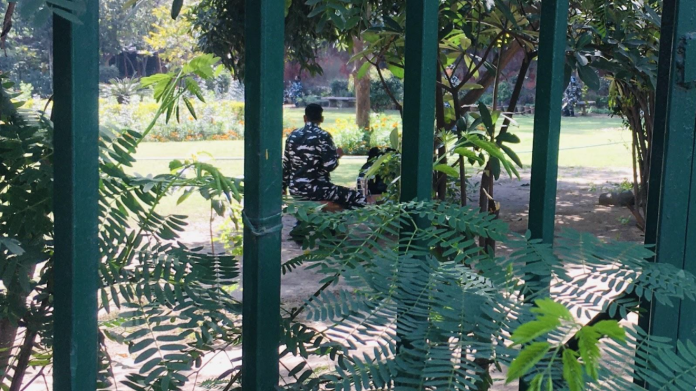As New Delhi’s Jamia Millia Islamia resumed physical classes this month, the heavy police presence leaves students unsettled.
Shadab Farooq | TwoCircles.net
NEW DELHI — Two years after the anti-CAA-NRC protests and the Covid-19 pandemic, Jamia Millia Islamia (JMI) reopened to offline classes for students in the final year of their undergraduate and postgraduate courses from March 15 and March 2 respectively.
When Nazre Alam, who is a witness to December 15, 2019, Jamia violence, now a final-year management studies student, came to campus for offline sessions, “many memories flashed back.”
“Whenever I enter the university, I still feel terror in my body,” he told TwoCircles.net.
When the university reopened, a police center was established near Gate No. 1and dozens of police and CRPF personnel were deputed at Gates No. 7 and 8. During the anti-CAA-NRC protest, the space around these gates came to be known as Jamia Square.
Sania, a development communication student, said, “Students had waited two years to be on campus and experience college life, only to find it regularly guarded by CRPF troops.” “Their appearance creates a fearful environment after the final memories of the campus (being attacked by the police.”
“Students with serious anxiety disorders and other mental health issues, like myself, deserve a secure environment,” Sania said.
“The constant presence of police, DTC special employees, police posts, and barbed wire gives it the distinct feel of an open prison,” Arbab Ali, a history graduate at JMI told TwoCircles.net. “The Jamia administration has been cultivating its ties with officers in uniform. It is increasingly relying on police officers to frighten students on campus,” he said.
Mashkoor Alam, a first-year student at JMI said that he and his batchmate, Numan, spoke with the university’s proctor about the police vehicle stationed at Gate No. 8, the only gate to enter his department. “He evaded any discussion about this, afraid that it might plague them in the future,” said Alam.
“The students are coping with a lot of uncertainty. Even students who have never been in trouble are concerned that they will be detained for no apparent reason. They avoid cops, parked cop cars, and police stations,” he said.
Uzair, a Mass Communication graduate, recounted being shocked when he and his friends realized that police personnel were posted at the campus disguised as staff employees.
“We approached a security guard to play a part in our college documentary project. but he flatly refused, claiming that he doesn’t work here but for the police,” Uzair said. “He wouldn’t tell us his name or anything, but the next day he was back,” he added.
“If this isn’t absurd, what is?” Syed Ali, a journalism student at the institution, told TwoCircles.net.
Ali said the realization that while students who come to university for education are “being monitored” was unsettling.
“Getting into and out of the Jamia Gate has turned into a psychologically draining exercise,” Ali added.
Humam Ahmed, a university student, is still affected by an incident six months ago when he and his friends were leaving the Jamia campus in the evening when a CRPF officer warned them not to stand on the road and to continue walking. “We were waiting for the transport to arrive, but our voices began to fade as a result of his authoritative actions, and we began walking,” he said.
“This is the fear they are instilling at the institution,” Humam said,
“We have been taught in management that you can’t use fear to motivate employees,” said Azam Kidwai, a PhD researcher at the Management Studies department. “How ironic,” Kidwai added, “that the same University that teaches you to be independent and courageous yet makes sure to suppress the voices with full force.”
Shadab Farooq is TCN SEED-Fellow. He tweets at @shadabfarooq_


